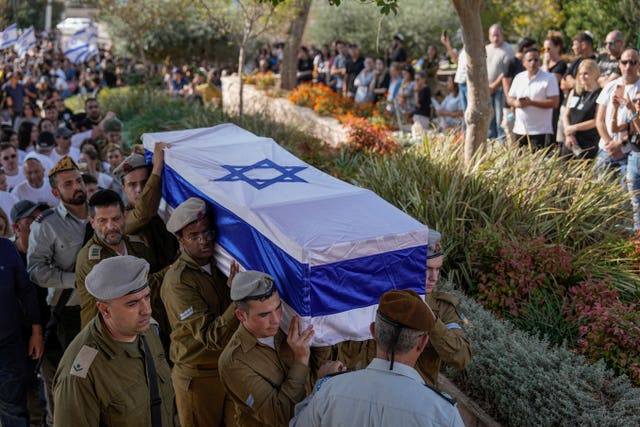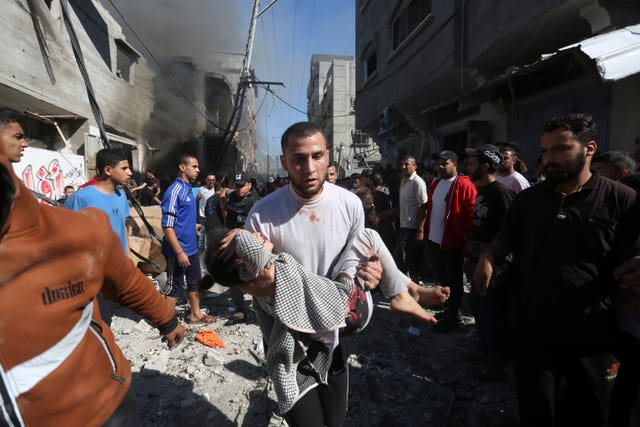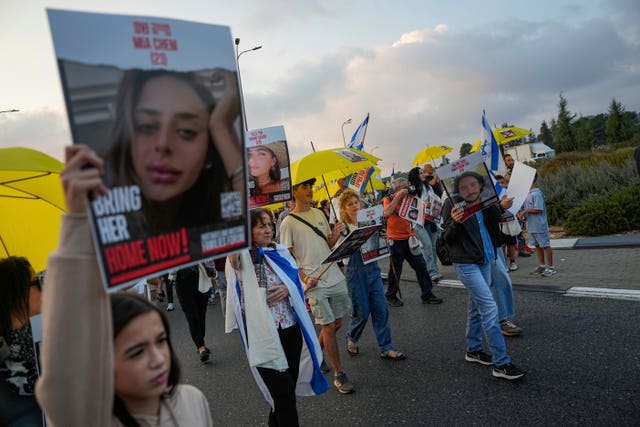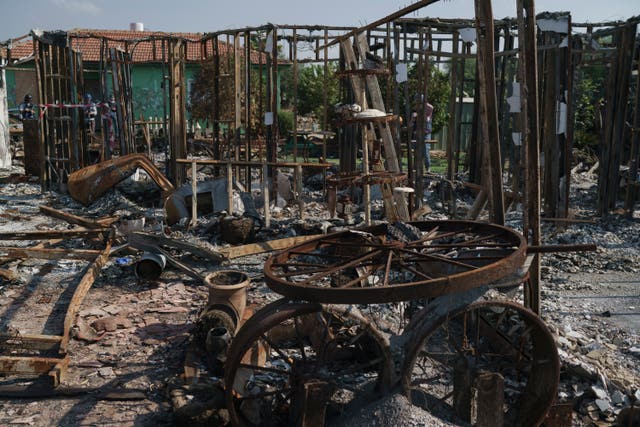The United Nations was forced to stop deliveries of food and other necessities to Gaza on Friday and warned of the growing possibility of widespread starvation after internet and telephone services collapsed in the besieged enclave because of a lack of fuel.
Israel announced that it will allow two tanker trucks of fuel daily into Gaza for the UN and communications systems.
The amount is half of what the UN said it needs to conduct lifesaving functions for hundreds of thousands of people in Gaza, including fuelling water systems, hospitals, bakeries and its trucks delivering aid.
Israel has barred entry of fuel since the start of the war, saying it would be diverted by Hamas for military means.
It has also blocked food, water and other supplies except for a trickle of aid from Egypt that aid workers say falls far short of what is needed.
The communications blackout largely cut off Gaza’s 2.3 million people from one another and the outside world.
The UN agency for Palestinian refugees, known as UNRWA, could not bring in its aid convoy on Friday because of the communications cut-off and will not be able to as long as it continues, said spokesperson Juliette Touma.
“An extended blackout means an extended suspension of our humanitarian operations in the Gaza Strip,” Ms Touma told The Associated Press.
Phone and internet services in parts of the Gaza Strip were partially restored on Friday night after a limited quantity of fuel for generators was provided, according to NetBlocks, a group that tracks internet outages.
Israeli forces have signalled they could expand their offensive towards Gaza’s south even while continuing operations in the north.
Troops have been searching the territory’s biggest hospital, Shifa, for traces of a Hamas command centre Israel alleges was located under the building – a claim Hamas and the hospital staff deny.
On Friday, the military said it found the body of another hostage, Corporal Noa Marciano, in a building adjacent to Shifa, like that of another hostage found on Thursday, Yehudit Weiss.
Hundreds of mourners, many carrying Israeli flags, attended Cpl Marciano’s funeral on Friday in her home town of Modi’in.

The war, now in its sixth week, was triggered by Hamas’s October 7 attack in southern Israel, in which the militants killed more than 1,200 people, mostly civilians, and abducted some 240 men, women and children.
More than 11,400 Palestinians have been killed in the war, two-thirds of them women and minors, according to Palestinian health authorities.
Another 2,700 have been reported missing, believed buried under rubble.
The count does not differentiate between civilians and militants, and Israel says it has killed thousands of militants.
After an American request, Israel agreed to let a “very minimal” amount of fuel into Gaza each day, national security adviser Tzachi Hanegbi said.
COGAT, the Israeli military body responsible for Palestinian affairs, said it would amount to 60,000 litres (15,850 gallons) a day for the UN.
For the communications network, Israel also agreed on another 10,000 litres a day (2,640 gallons), a US State Department official said .
UNRWA and other humanitarian groups need at least 120,000 litres (31,700 gallons) a day to run lifesaving functions, Ms Touma said.

It was not immediately known if the fuel for communications would be enough to revive the network.
Gaza has received only 10% of its required food supplies each day in shipments from Egypt, according to the UN, and the water system shutdown has left most of the population drinking contaminated water, causing an outbreak of disease.
Dehydration and malnutrition are growing, with nearly all residents in need of food, said Abeer Etefa, a Middle East regional spokeswoman for the UN’s World Food Programme.
“People are facing the immediate possibility of starvation,” she said from Cairo.
Israeli officials previously vowed fuel would not be let in until Gaza militants release the hostages.
The government has been under heavy public pressure in Israel to show it is doing all it can to bring back the men, women and children abducted in Hamas’s attack.
Thousands of marchers – including families of more than 50 hostages – embarked on Friday on the fourth leg of a five-day walk from Tel Aviv to Jerusalem, chanting, “Bring them home!”
They are marching to Prime Minister Benjamin Netanyahu’s office, calling on his war cabinet to do more to rescue their loved ones.

They have urged the cabinet to consider a ceasefire or prisoner swap in return for the hostages.
Hamas has offered to exchange all hostages for some 6,000 Palestinians in Israeli jails, which the cabinet has rejected.
With Israeli troops fanned out around the Shifa hospital complex, doctors spoke of horrifying conditions inside.
Electricity has been out for nearly a week, leaving incubators for infants and ventilators for ICU patients defunct.
Nearly 7,000 people are trapped there with little food, including patients, staff and civilian families.
Hospital director Mohammed Abu Selmia told Al-Jazeera television that 52 patients have died since fuel ran out – up from 40 reported before Israeli troops stormed in on Wednesday.
He said staff were amputating limbs of some injured to avoid infection spreading because of shortages in medicines.
More were on the verge of death as their wounds are “open with maggots coming out of them”, another doctor, Faisal Siyam, told Al-Jazeera.

Dr Ahmad Mukhalalti said most of the 36 premature infants suffer from severe diarrhoea because there is no clean water.
He said Israeli troops had taken away all the bodies from the mortuary and from a mass grave that staff dug days earlier in the courtyard.
The Israeli military had no comment on the report.
The doctors’ accounts could not be independently verified.
Abu Selmia said Israeli troops should either bring them fuel to power equipment or allow an evacuation.
“The hospital has become a giant prison,” he said.
“We are surrounded by death.”
Israel’s military said it delivered 4,000 litres of water and 1,500 ready-made meals to Shifa, but staff said it was too little for the numbers there.
Israeli military spokesman Colonel Richard Hecht acknowledged that the troops’ search for traces of Hamas was going slowly.
“It’s going to take time,” he said.
Israel faces pressure to prove its claim that Hamas set up its main command centre in and under the hospital.
So far, Israel has shown photos and video of weapons caches that it says were found inside as well as what it said was a tunnel entrance.
The AP could not independently verify the Israeli claims.
The allegations are part of Israel’s broader accusation that Hamas uses Palestinians as human shields across the Gaza Strip, contending that is the reason for the large numbers of civilian casualties during weeks of bombardment.




Comments: Our rules
We want our comments to be a lively and valuable part of our community - a place where readers can debate and engage with the most important local issues. The ability to comment on our stories is a privilege, not a right, however, and that privilege may be withdrawn if it is abused or misused.
Please report any comments that break our rules.
Read the rules here